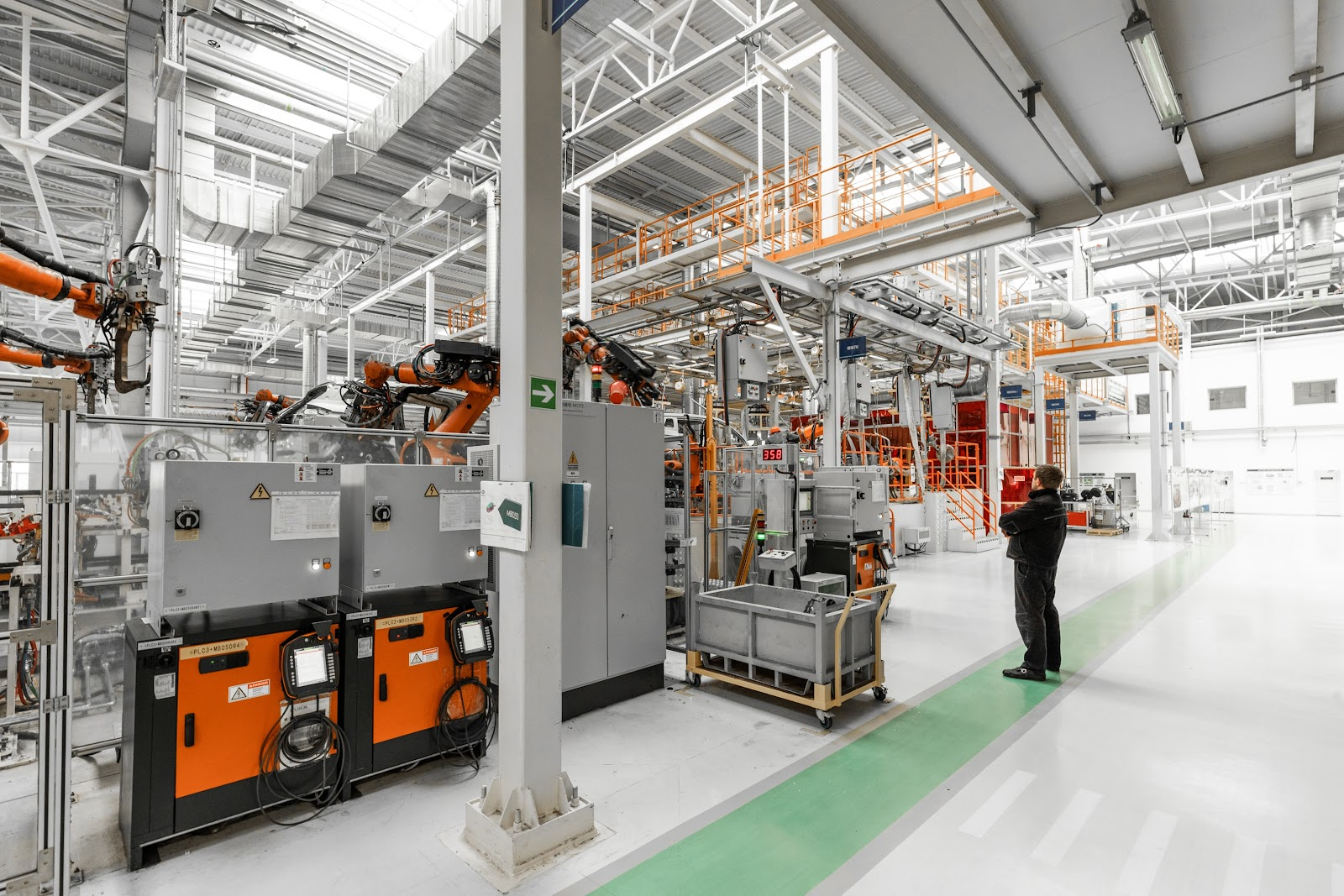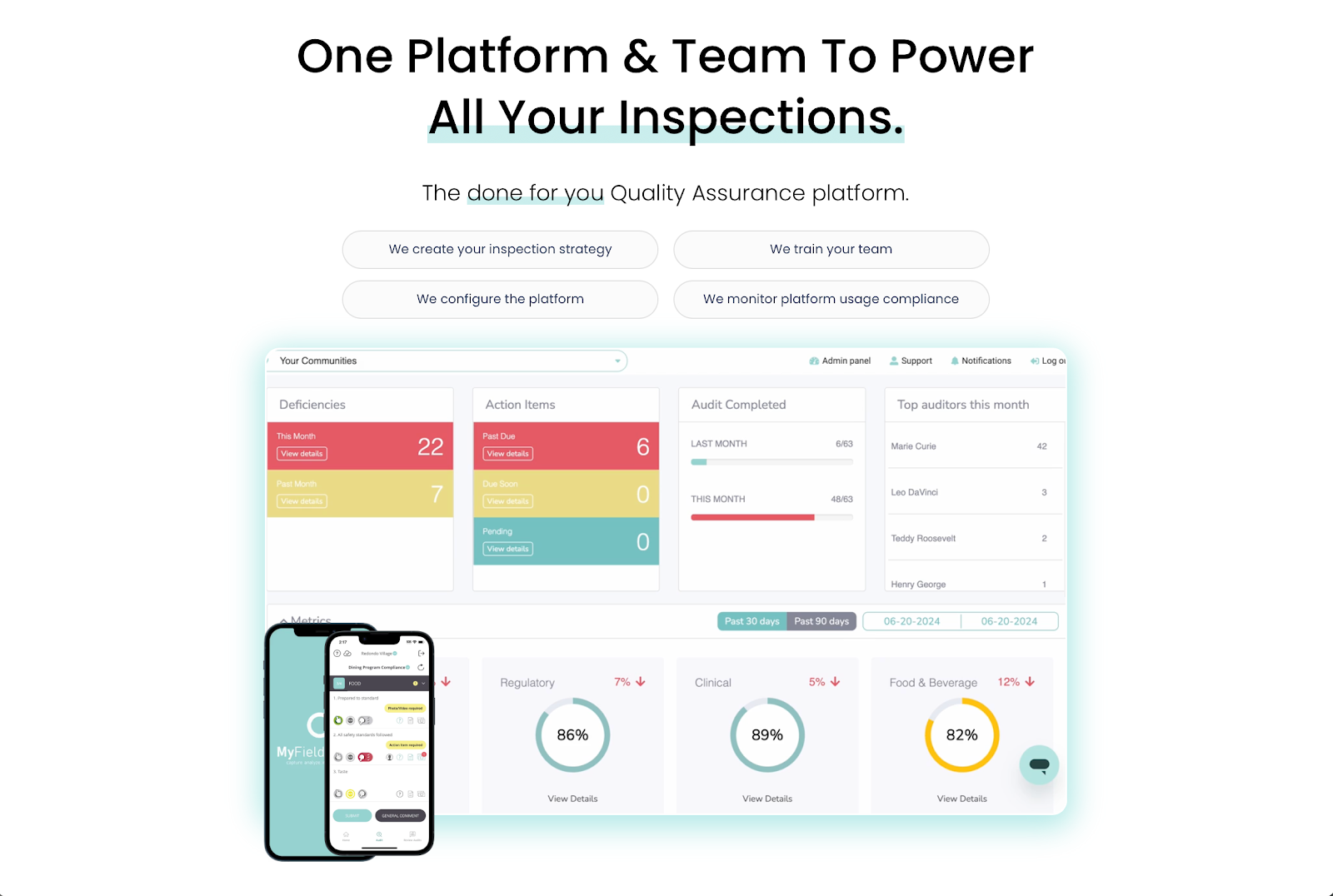.svg)
Facility Operations Management: Tips for Various Use Cases

Take Control of QA.
Make Inspections Effortless.

We’ll quickly uncover your needs and share how we can help—no pressure, no stress, just solutions. Grab your spot on our calendar today!
Be survey-ready every day with three simple dining audits

We’ll quickly uncover your needs and share how we can help—no pressure, no stress, just solutions. Grab your spot on our calendar today!
Managing facilities is more than just keeping buildings operational. It’s also about keeping people safe, productive, and satisfied.
Whether you run a manufacturing plant, oversee a chain of restaurants, or operate an assisted living facility, the way you manage daily operations has a direct impact on cost control, compliance, and client trust.
In this guide, we’ll discuss the definition and importance of facility operations management. We'll also cover the common challenges and practical tips for different industries.
What Is Facility Operations Management?
Facility operations management is the process of running and maintaining facilities so they stay safe, reliable, and cost-efficient. It covers people, facility assets, and the work environment.
Facility management comes in two categories: hard services and soft services.
Hard facility operations management deals with physical building systems, such as HVAC, lighting, and machinery. Meanwhile, soft facility operations focus on services that affect people using the facility, like cleaning, catering, and security.
Why Are Effective Facility Operations Important?
Here's why effective facility operations management matters:
Improve Operational Efficiency
Effective facility management keeps different teams aligned and prevents wasted time on repetitive tasks. Instead, it focuses on reliable processes that maintain operational efficiency and avoid breakdowns.
This also supports business continuity planning, which is important in industries where downtime can cost thousands of dollars per hour.
Meet Regulatory Compliance
Different facilities face strict rules, from workplace safety to quality control. Failing to meet these regulations can lead to fines, penalties, and other legal consequences.
Fortunately, facility operations management provides the necessary structure to schedule inspections, document results, and prove accountability. When auditors visit your facility, you’ll have real-time reports that you can share to ensure compliance.
Standardize Multi-Site Processes
Multi-site facility managers know how quickly standards slip when each location does things differently.
With effective facility operations, you can follow consistent routines, inspections, and reporting. This prevents errors, keeps staff aligned, and simplifies day-to-day operations across multiple facilities.
Boost Client Satisfaction and Retention
Clients leave when they don’t see the value of your facility management services.
With the right facility management system, you can show proof of performance through instant and shareable reporting. This transparency builds client trust and loyalty.
You can also manage budgets more effectively by showing resource allocation to clients and how those investments protect their interests.
Reduce Costs
Facilities are expensive to run, and poor oversight only drives costs higher.
Facility operations management can reduce operating costs by focusing on preventative maintenance and efficient asset management.
It also cuts waste, extends the life of assets, and aligns daily practices with long-term organizational goals.
Common Challenges in Facility Operations Management
Below are the difficulties you might face when managing facilities:
- Unplanned downtime and emergency repairs: Breakdowns in core business equipment disrupt production, delay service, and require costly fixes that put pressure on your operations. These problems often arise due to the lack of real-time visibility across your facilities.
- Compliance with health and safety regulations: Ensuring health and safety compliance is difficult when managing multiple facilities. You need to conduct regular inspections and meet reporting requirements across different locations.
- Staff turnover and training gaps: High turnover creates unexpected challenges, forcing you to constantly retrain facilities operations specialists. This can waste valuable time and create inconsistencies.
- Miscommunication: Site teams interpret standards differently, which may cause potential risks. Without the right tools, leadership teams lack visibility into site conditions, inspections, or staff performance.
- Vendor and client management: Contracts, repairs, and expectations are difficult to balance if your organization has scattered records and misaligned teams.
10 Tips for Successful Facility Management (Different Use Cases)
You can follow these tips to address the challenges mentioned above:
Manufacturing and Industrial Facilities
Running a manufacturing or industrial site comes with unique pressures. You constantly deal with heavy machinery, strict safety standards, and tight production deadlines.
Even small errors in multi-site management can cause costly downtime, impact worker safety, or slow delivery schedules.
Facility managers in these environments should balance maintenance schedules, keep equipment reliable, and monitor energy costs, all while staying compliant with industry regulations.
1. Implement Predictive Maintenance Plans
Predictive maintenance uses sensors and data collection to forecast equipment failures before they happen.
When you identify issues early, you can avoid costly breakdowns and reduce downtime. You also extend the lifespan of machinery and other assets, helping you get the most from every investment.
2. Maintain a Detailed Asset Inventory
A complete inventory of machines, tools, and facility resources gives you control over what you have and how they are used across multiple sites.
This helps you assign tasks to the right maintenance staff, track warranty information, and plan smarter replacements.
You can also prepare backup systems to ensure business continuity, even if critical equipment fails.
3. Use a Facility Inspection Checklist
Regular audits highlight small problems before they grow into costly shutdowns. Consider using a facility inspection checklist to ensure no important step is skipped.
This document covers everything, from maintaining building systems to managing space allocation.
By following a clear inspection process, facility managers can catch issues quickly, improve accountability, and create a record that helps prove compliance when needed.
4. Invest in Facilities Management Software
Relying on paperwork and spreadsheets often leads to lost records, duplicate entries, and delays in decision-making. When inspections are logged manually, facility managers struggle to maintain standards, assign tasks, or prove compliance.
Facilities management software replaces these gaps by centralizing information about inspections, staff, asset inventory, and energy usage in one place.
It gives leadership real-time visibility into what's happening on the ground, making it easier to hold teams accountable. Over time, this can improve operational efficiency, optimize resources, and cut costs.
Restaurants and Food Service Operations
Restaurants and food service management companies must meet strict food and beverage regulations. Facility managers in this sector should focus on safety, hygiene, equipment upkeep, and customer satisfaction while staying profitable.
5. Establish Strict Hygiene and Food Safety Protocols
Clear hygiene and food handling protocols protect customers from contamination and other safety issues.
Establish food standard operating procedures and define clear job responsibilities to help staff stick to rules.
When every worker knows their role, you improve safety in kitchens and dining areas. You also reduce the risk of failed health inspections, which can damage both your reputation and revenue.
6. Schedule Regular Pest Control and Sanitation Checks
Restaurants are prone to pest infestations. Conduct routine pest control to protect food storage and physical spaces from contamination.
You should also inspect facility cleanliness and sanitation. For example, make sure tables and food contact surfaces are regularly wiped. You can also check if waste management practices are being closely followed.
By integrating these checks into your operations, you can minimize food safety risks. A regular cleaning schedule also helps you stay prepared for surprise visits from local health departments.
7. Maintain Kitchen Equipment and Other Tools Needed for Ensuring Safety
Maintain equipment, such as refrigerators, grills, and dishwashing machines, to prevent breakdowns during busy service hours. Well-maintained tools also reduce energy use and improve food quality.
Besides kitchen equipment, you should regularly inspect fire safety alarms, smoke detectors, sprinkler heads, and other security systems. Make sure they are functioning properly to guarantee the safety of building occupants in case of emergencies and natural disasters.
Senior and Assisted Living Facilities
Assisted living facilities should manage buildings and assets while protecting the health, comfort, and dignity of residents. That means every detail, from air quality to accessibility, has a direct impact on senior living regulatory compliance.
8. Keep Areas Clean and Clutter-Free
Cluttered hallways or unclean spaces increase the risk of falls and infections.
A well-built environment prioritizes resident safety and comfort, with strict routines in place for cleaning and space organization.
Regular housekeeping schedules also reduce stress for staff, who no longer scramble to correct problems at the last minute.
Clean spaces support better health outcomes and give families confidence that their loved ones are in safe hands.
9. Ensure Accessibility in Facility Design and Maintenance
Accessibility is key to senior care. Ramps, elevators, and handrails maintain independence while reducing safety risks.
Conduct regular audits and inspections to preserve the structural integrity of facilities so these features remain safe over time.
10. Maintain Reliable HVAC and Air Quality Systems
Air quality affects comfort and health in senior living facilities. Well-maintained HVAC systems keep residents warm in winter, cool in summer, and safe from airborne illnesses.
Consider shifting to energy-efficient systems to reduce operating costs while keeping residents comfortable year-round.
Successful Facility Operations Management With MyFieldAudits

MyFieldAudits helps you manage facility operations with clarity, consistency, and accountability. Instead of relying on paperwork or spreadsheets, your site teams get a mobile app that empowers them to conduct inspections in real time.
These mobile inspections automatically sync to clean, shareable reports. Leadership teams get instant clarity on what's going on across multiple locations. Meanwhile, clients can see the value you provide through every audit.
More importantly, MyFieldAudits acts as a retention engine for enterprise clients. They will manage the entire lifecycle of on-site inspections while training your team to run a well-managed facility.
The experts behind MyFieldAudits will handle the heavy lifting for your organization so you can focus on capturing the critical data that drives long-term success.
Schedule a discovery call today to make facility operations run smoother! Or, visit this product overview to learn how MyFieldAudits can improve your site.
FAQs About Facility Operations Management
What is facilities operations management?
Facilities operations management is the process of overseeing buildings, assets, and services so they stay safe, reliable, and efficient. It usually covers inspections, cleaning, compliance, and scheduled maintenance of equipment.
What is a facility in operations management?
A facility is any physical site where business activities happen, such as a manufacturing plant, restaurant, or assisted living center. In operations management, the facility includes buildings, electrical systems, HVAC units, and staff services that you should closely govern for safety and compliance.
What are the four pillars of facility management?
The four pillars are people, processes, place, and technology. Effective facility management integrates people with tools and clear workflows to keep operations consistent across sites.
%201.svg)






%201%20(1).svg)